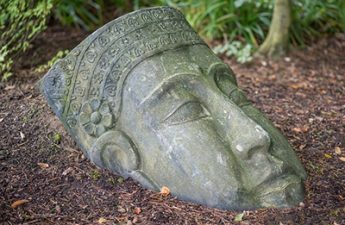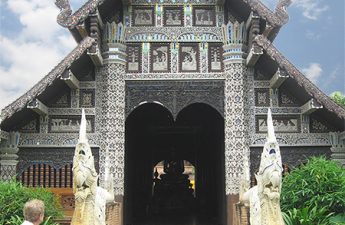 The following paragraph is from Japan missionary Stella Cox’s February 2022 newsletter. Stella, being around 90 years of age, has long seen and understood the emptiness in Buddhist and Shinto worship. I could feel her heartache as I read:
The following paragraph is from Japan missionary Stella Cox’s February 2022 newsletter. Stella, being around 90 years of age, has long seen and understood the emptiness in Buddhist and Shinto worship. I could feel her heartache as I read:
Over the New Year, thousands of Japanese worshipped at [Shinto] shrines and [Buddhist] temples—praying for health, wealth, and security. It is sad to see so many people lined up waiting to pray and give money to manmade nothingness.
Perhaps it doesn’t seem politically correct to call the objects of people’s worship “manmade nothingness.” But Stella loves the Japanese people with the Lord’s love. She doesn’t want this emptiness for them—and she reflects the Lord’s distaste for such unprofitable reverence/devotion: “The one who makes [an idol] trusts in his own creation; he makes idols that cannot speak” (Habakkuk 2:18),
Bible commentator Matthew Henry (who wrote in 1706!) couldn’t resist taking a sarcastic jab at false gods. He too deeply loved and respected the Lord. And it’s obvious throughout his commentary that he wanted others to believe the truth.
Henry was commenting on 1 Chronicles 10:8-10, which describes the gruesome conquering of King Saul’s armies by the Philistines. The Bible says, “When the Philistines came to strip the dead, they found Saul and his sons fallen on Mount Gilboa. They stripped him and took his head and his armor, and sent messengers throughout the land of the Philistines to proclaim the news among their idols and their people. They put his armor in the temple of their gods and hung up his head in the temple of Dagon” (bold added).
Then Henry comments: “When [the Philistines] had obtained victory over Saul, they ‘sent tidings to their idols’—poor idols, that did not know what was done a few miles off till the tidings were brought them, nor then either!”
Yes, what impotent gods! Shouldn’t gods be all-knowing? But of course, they weren’t even real—and so wouldn’t know anything, no matter how many messengers were sent. (By the way, Henry’s commentary is available for reference free of charge.)
Some of the Bible greats similarly cast aspersions on “manmade nothingness.”
Think of Elijah at the challenge on Mount Carmel. Those people had foolishly and deliberately pushed the true God aside in favor of the false Baal(s). As their prophets tried to conjure fire from their god, nothing happened. Elijah couldn’t help himself: “‘Shout louder!’ he said. … ‘Surely he is a god! Perhaps he is deep in thought, or busy, or traveling. Maybe he is sleeping’” (1 Kings 18:27).
And what about Isaiah 44’s detailed description? Isaiah describes how someone would cut down a tree, use part of it for their cooking fire, and then, unfathomably, make the rest into an idol to worship. About these gods-from-trees, Isaiah was completely stumped (no pun intended!) that it didn’t occur to the person, “Is not this thing in my right hand a lie?” (v. 20).
Paul in Athens watches his tone but, being “greatly distressed to see that the city was full of idols,” told the crowd, “I see that in every way you are very religious.” And pointing out an idol designated “to an unknown god,” he says, “What you worship as something unknown I am going to proclaim to you.” Paul’s speech brought some sneers, but some people believed or at least wanted to hear more (Acts 17:16ff).
We sometimes forget that there is such a thing as “counterfeit miracles, signs and wonders” (2 Thessalonians 2:9). Sometimes the dark side, the manmade nothingness, works—or seems to. I tell people, “Well, stealing works. Lying works … But stepping off the Lord’s path is a trap.”
As the Lord told Isaiah: “I am the first and I am the last; apart from me there is no God. … Is there any God besides me? No, there is no other Rock” (Isaiah 44:6, 8). Stella’s report above concluded with this: “The creation can never take the place of the Creator, and worship, no matter how devoted, means nothing apart from Christ.”


